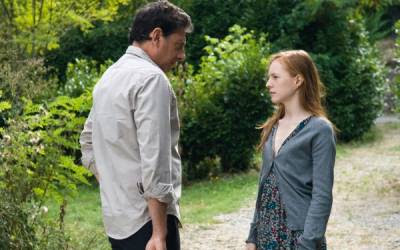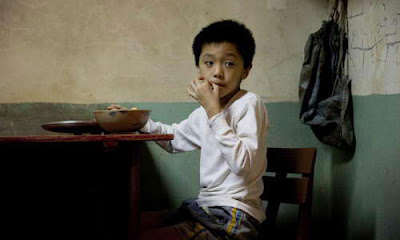 607
607 - Before getting to Day Four's films, I wanted to mention this short by Liu Jiayin that played before Day Three's showing of
Thomas Mao. Liu made my favorite film from last year's festival,
Oxhide II, which also happens to be the highest rated film directed by a woman on my recent
Top 600 Films of All-Time list. This 17 minute short consists mostly of one shot of a bathtub in a hotel room (the hotel apparently commissioned the film). A plastic fish, manipulated by Liu's father, with only his hands visible, swims in the water and encounters some mushrooms, a cloudy sky and a fish hook. The mushrooms are played by Liu's mother and Liu herself is the sky and hook. It's a marvelous bit of silliness that conveys all the warmth of a family at play.
Hahaha - The first of two films directed by Hong Sangsoo at this year's festival, it begins, unsurprisingly for Hong, with two old friends drinking and telling stories about women. The film proper is comprised of these two stories, which end up being about the same woman, though neither knows it, while the frame is played in black and white stills with voiceover (and lots of "Cheers!" as the two drink quite a lot). The Hong films I've seen all have a split structure, with the second half of the film telling a new story with some of the same characters in a way that mirrors and comments upon the events of the first story. This film has that same structure, but the stories are intercut instead of segregated. This makes the film a lot easier to watch, and this is definitely the film I'd recommend to anyone who hasn't seen a Hong Sangsoo film yet. As for the stories themselves, they're Hong's traditional terrain of romantic misadventures and misunderstandings and lots and lots of drinking. Again there's a character who's a film director, this time he falls for a tour guide who's dating a poet who's best friends with a guy who's on vacation from his wife with his girlfriend. It's this last guy and the director who are the two narrators of the film. It's as funny as
Like You Know It All, one of my favorites at last year's festival, if not quite as weird and certainly not as insidery about film festival life.
The Fourth Portrait - This Taiwanese film is about a precocious young boy named Xiang who's father dies, sending him first into the helpful hand's of the school janitor, and then back to his mom, a prostitute (naturally) and step-father (who's pretty much pure evil). Director Chung Mong-hong keeps this dire material much lighter than one would expect. Though the kid's situation is rough and potentially terrifying, there's enough humor and visual style (there's traces of both the Taiwanese New Wave (Hou, Yang and Tsai specifically) but also Wong Kar-wai, the latter especially in the scnes at the mom's "lounge") that things never get as horribly depressing as they might in a lesser film. There's even a musical bit that sounds like a Chinese version of the Carl Orff song used in
Badlands and
True Romance) Xiang is surrounded by helpful adults, from the elderly janitor to a small time hustler to a concerned teacher. Even his mom is a decent sort. We never get the sense that Xiang's situation is hopeless, instead, we can be sure that he'll survive and thrive. The title comes from a series of drawing's Xiang makes throughout the film: the first is his father, the second his friend the hustler, the third his older brother who may be haunting him and the fourth, more than a little cheesily, is the film itself.
I Wish I Knew - After last year's excellent
24 City, I wasn't quite prepared for this latest film from Jia Zhangke. While that film was a documentary that mixed scripted and acted interviews with real-life talking heads in a way that made one question the nature of documentary realism, this film is pretty much a straight and conventional film. It's an epic collection of stories about Shanghai, told by the people who lived there and the children of the people who lived there. Shanghai was the epicenter for the most important developments in China over the 20th Century, from the British to the Japanese Invasion to the Civil War between the Communists and Chaing Kai-Shek's KMT to the Cultural Revolution to the embrace of capitalism in the late 1980s. Even the Chinese film industry was based there for much of the century. Jia's 18 interviews tell these stories in detail, with communists and KMT generals and movie stars and directors. Wei Wei appears, which marks two days in a row that we saw a film featuring this 88 year old actress, after
The Drunkard. Also interviewed are Hou Hsiao-hsein (who's actually the only person who doesn't share a personal anecdote, he just talks about his film
Flowers of Shanghai, though like many people in the film, his parents came to Taiwan from Shanghai ahead of the Communist victory). The film is very loosely structured, with the interviews coming not in chronological order of their stories, but rather the geographical order of where they have spread out. The Shanghai diaspora mainly went to Taiwan and Hong Kong, and so Jia goes to each of those places to seek out their stories. But these interviews are interspersed with scenes of present-day Shanghai, where frequent Jia star Zhao Tao wanders mutely around the sites of the old stories, neatly tying the old and new, the diasporic and the homeland together. It's a beautiful film, about as good as a straight documentary can be.
Short Celebrity Addendum: Jia was there last night for a Q & A (he's serving on the jury at the festival this year for the award for new Asian filmmakers that they've given out for 17 years or so, having previously won the award for his own first film
Xiao Wu). I don't know that I've ever been so giddy in a movie theatre. And then this morning, waiting in line for Catherine Breillat's
Sleeping Beauty, I'm pretty sure we were standing behind a very confused Wallace Shawn (the screening was delayed for projection reasons and the staff were giving confusing directions to the old people). I attempted to help the maybe-Shawn through the line, but he either couldn't hear me or was too confused to pay attention to a much taller man.


















